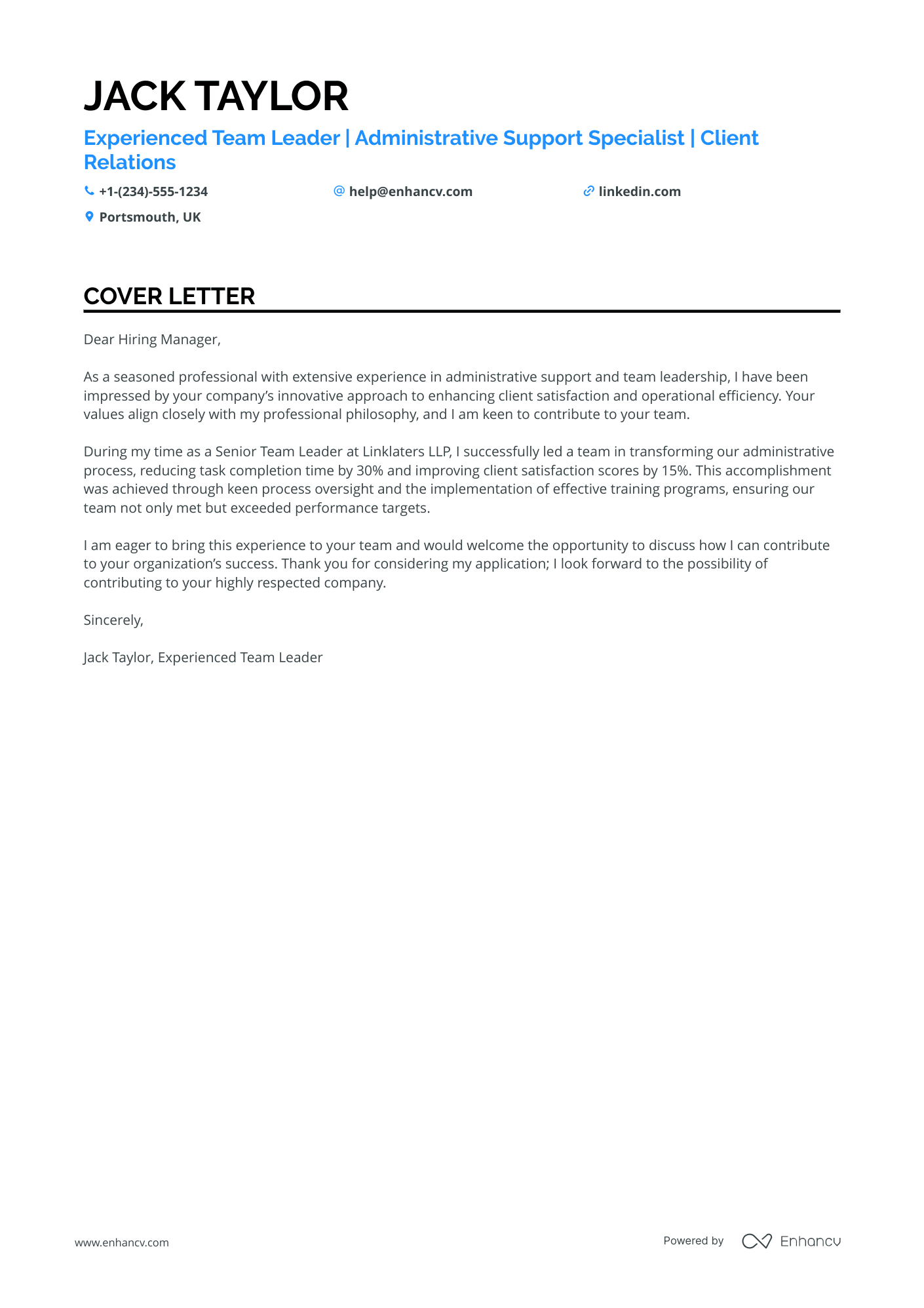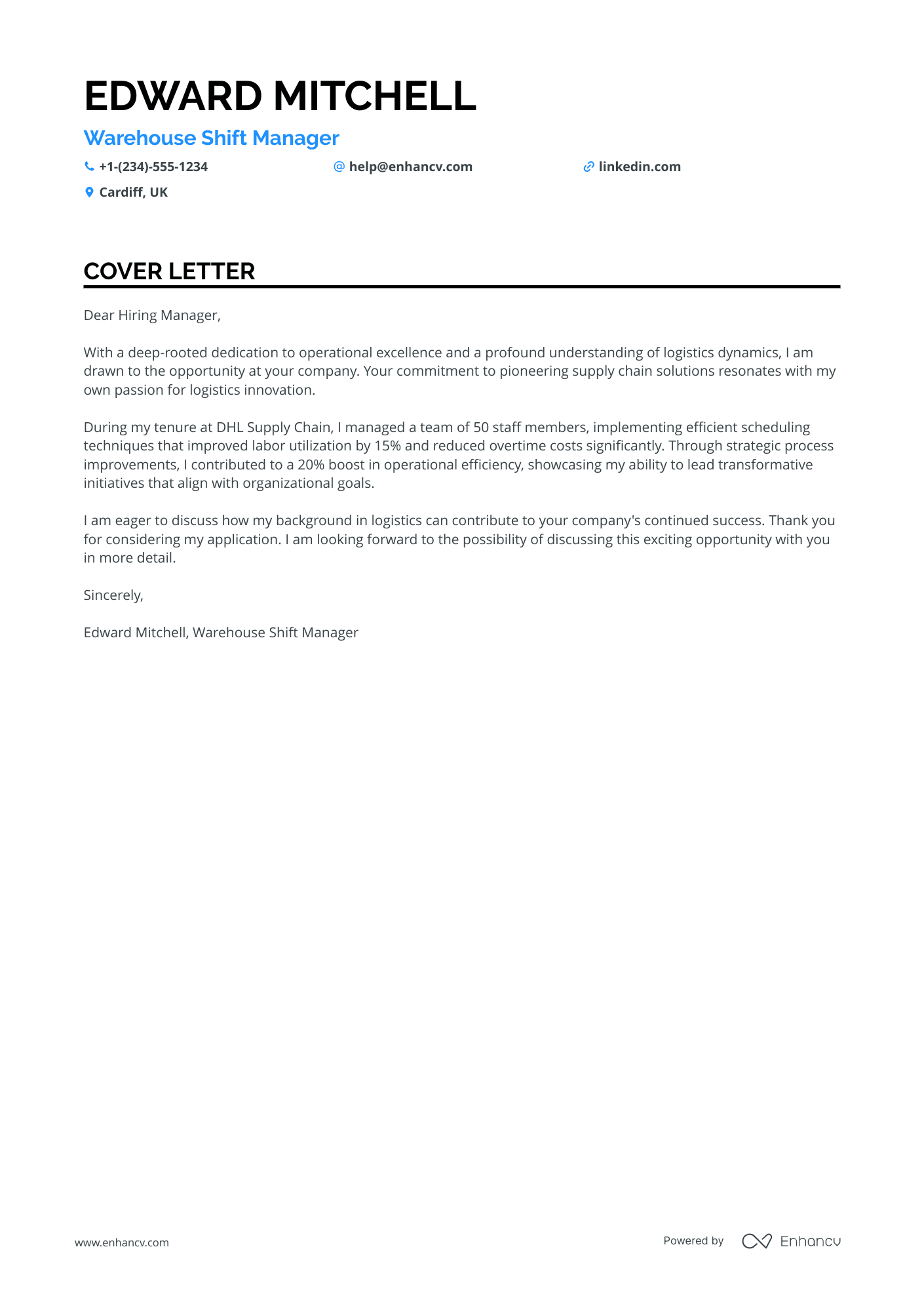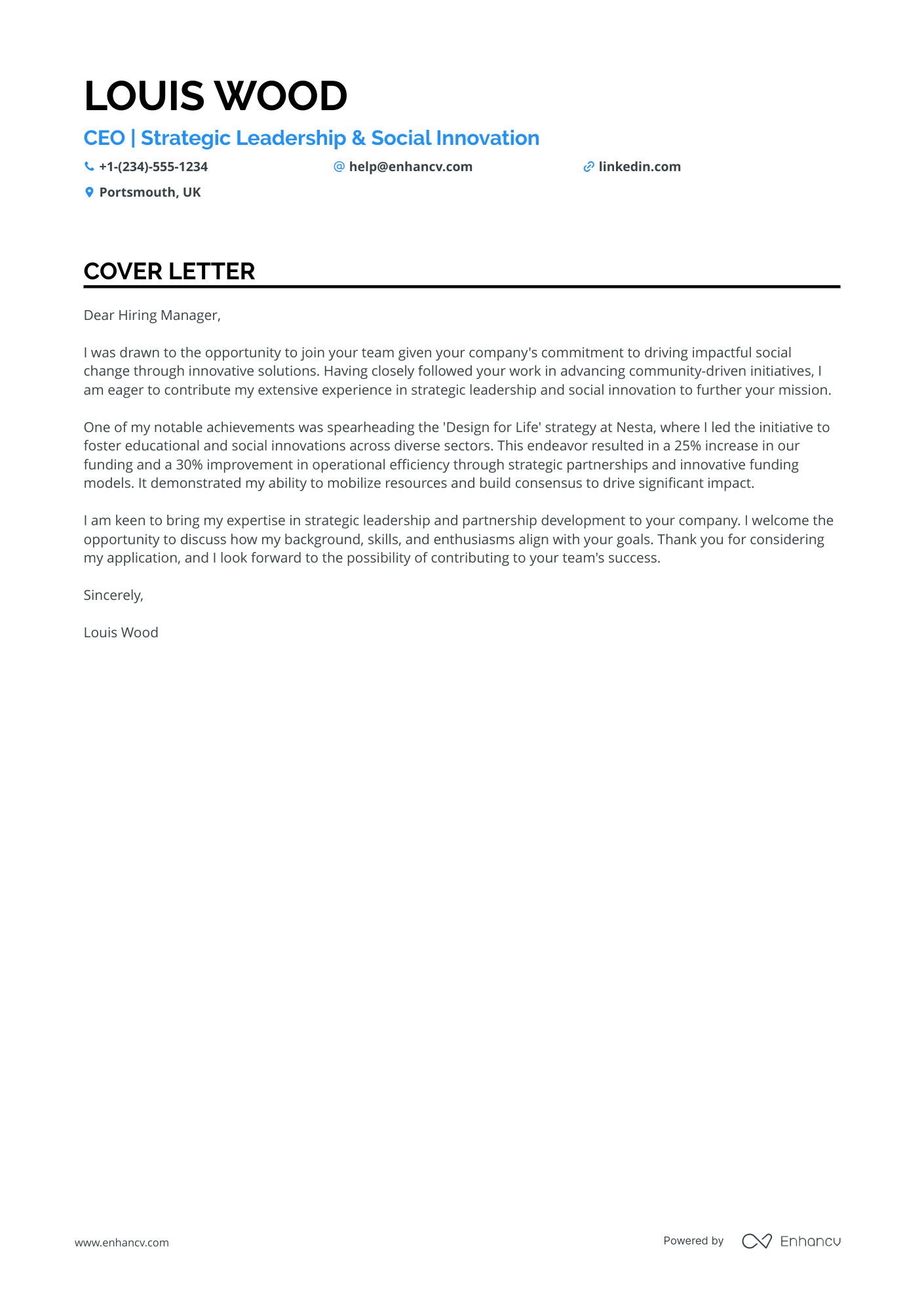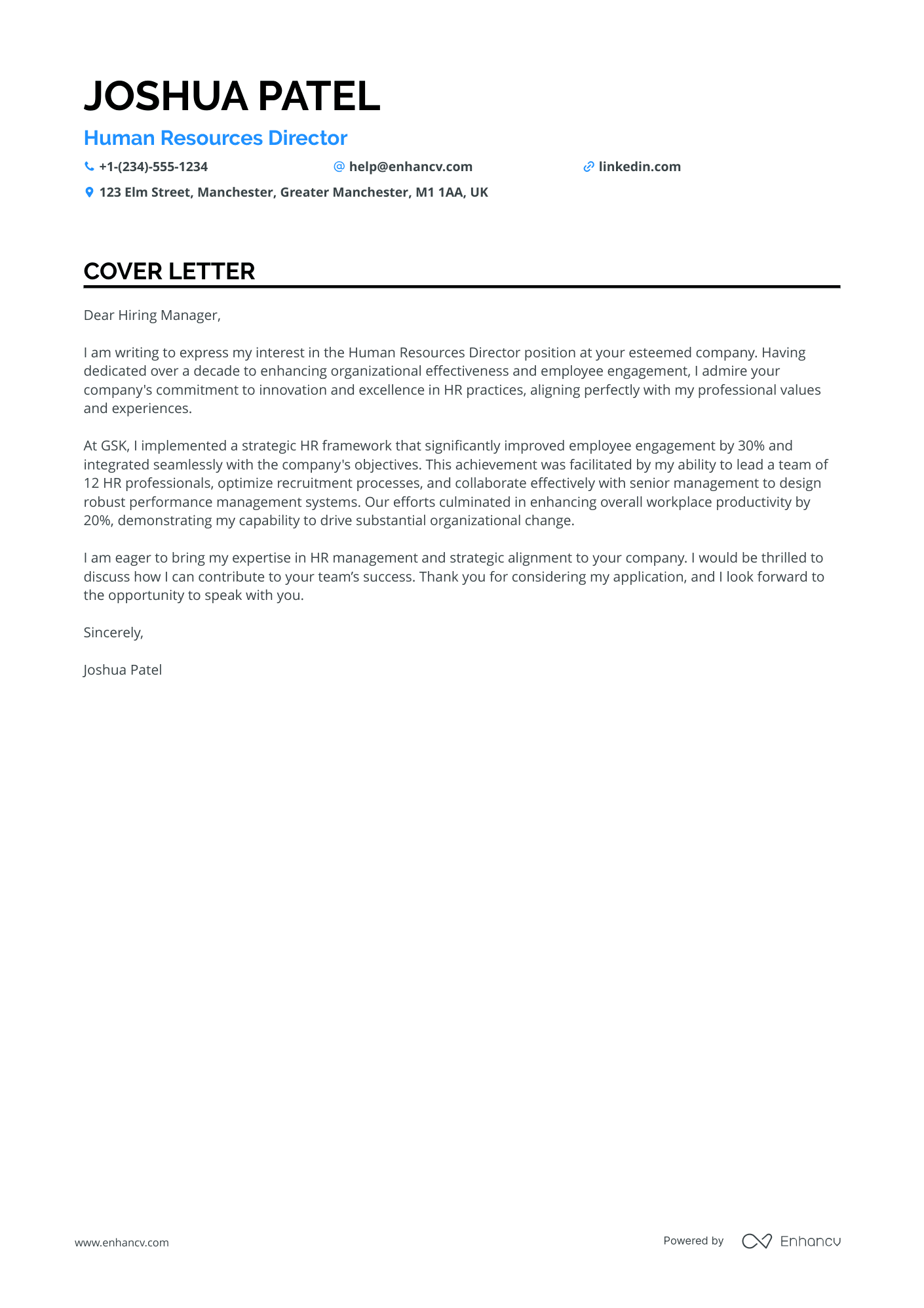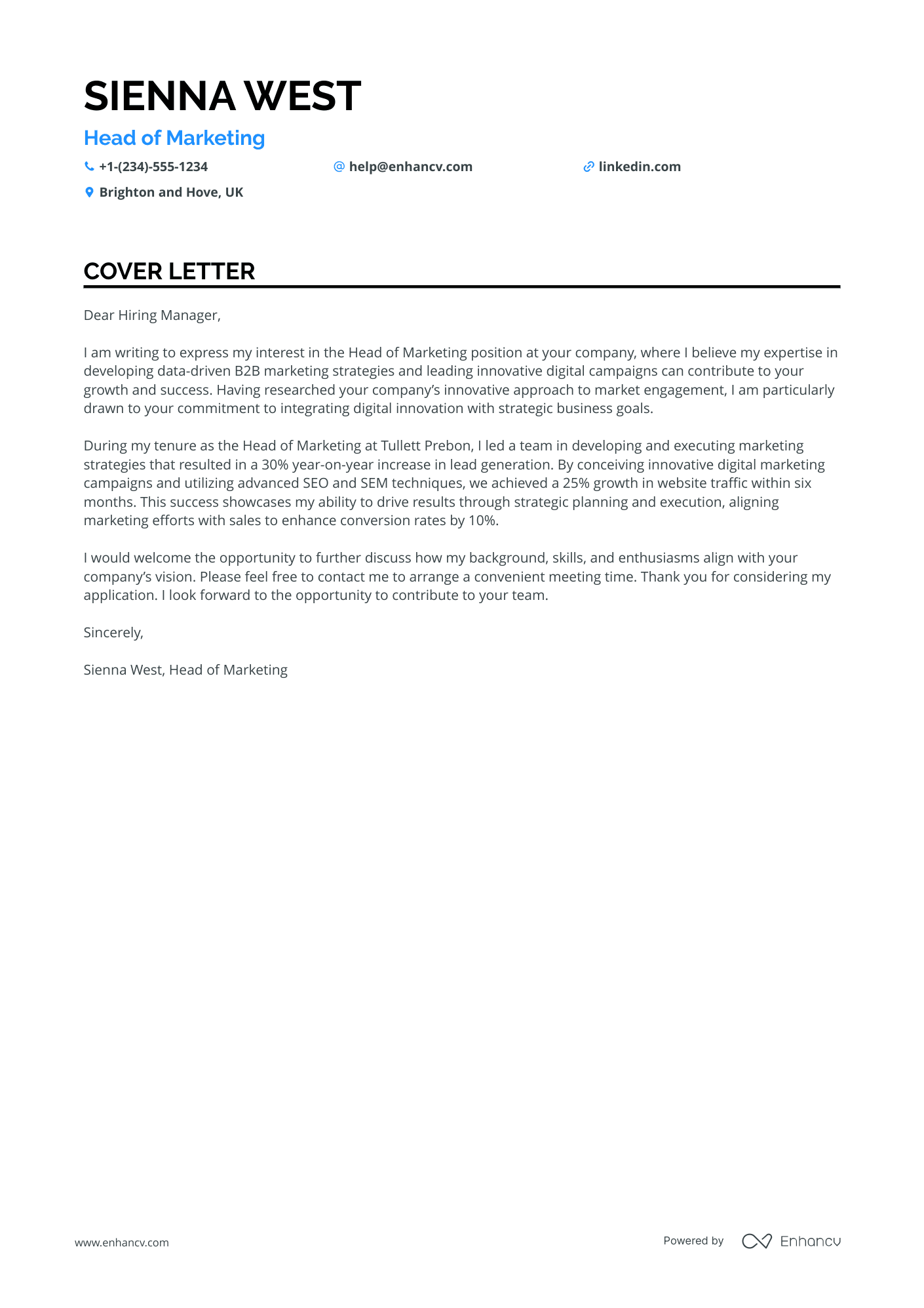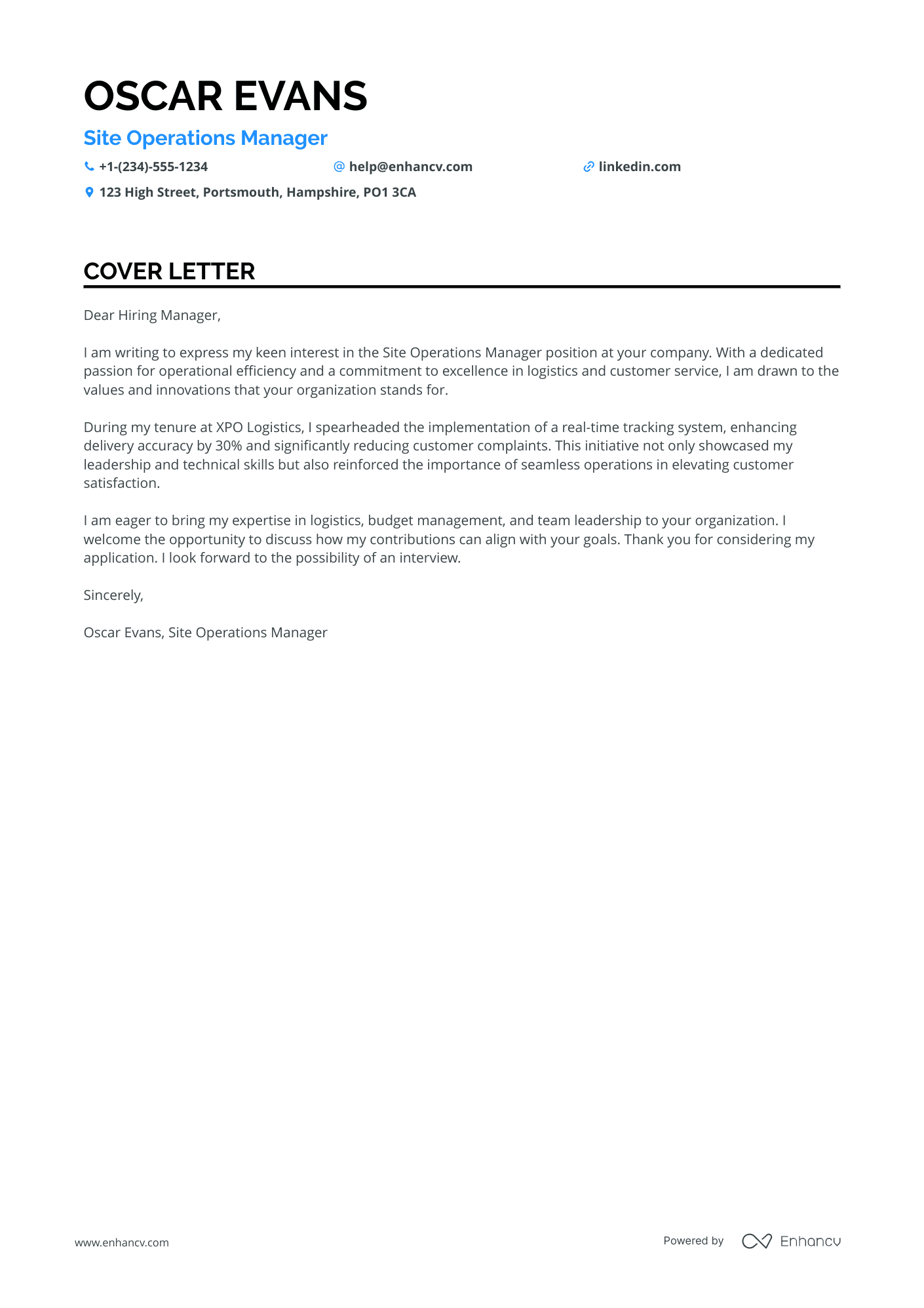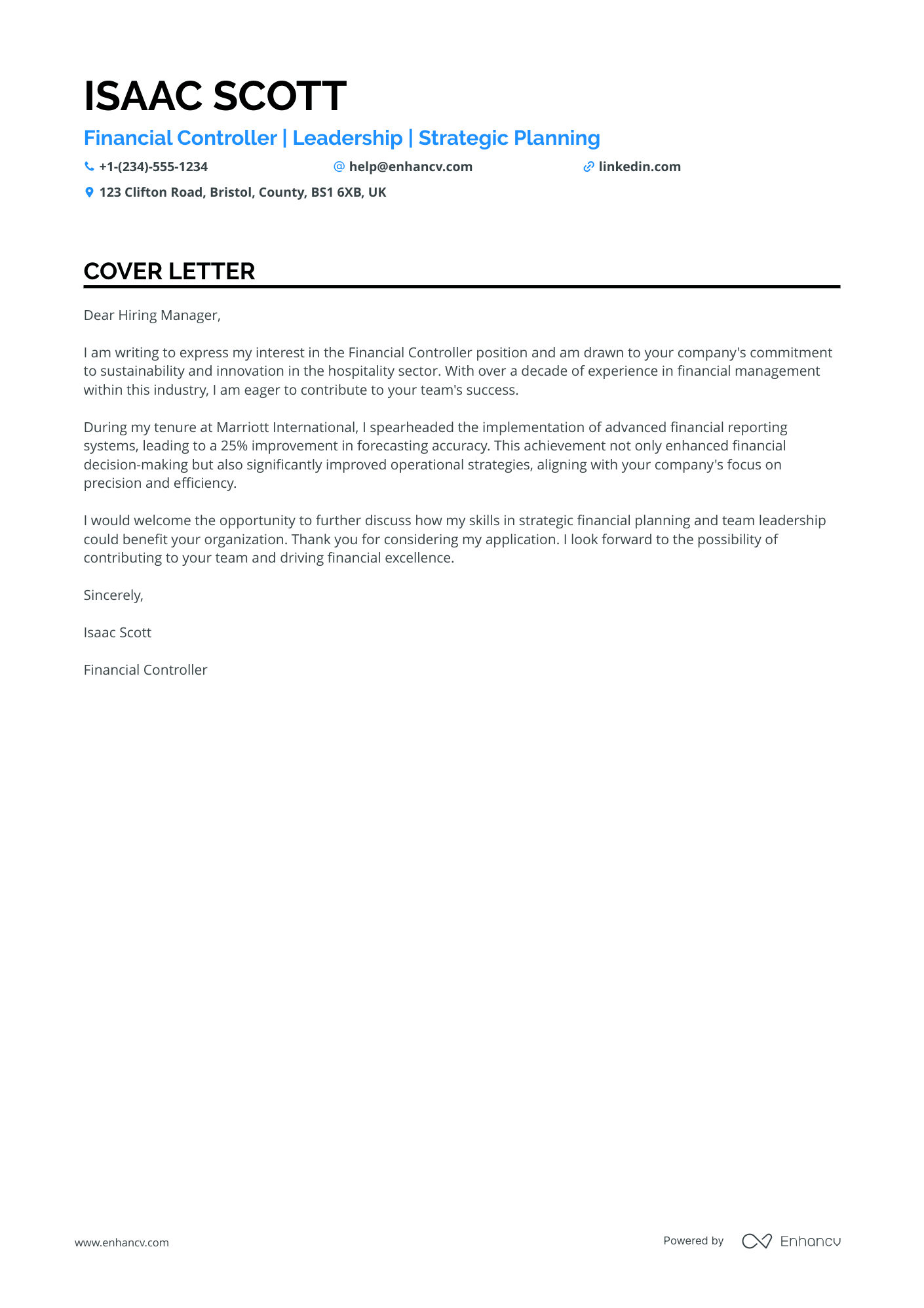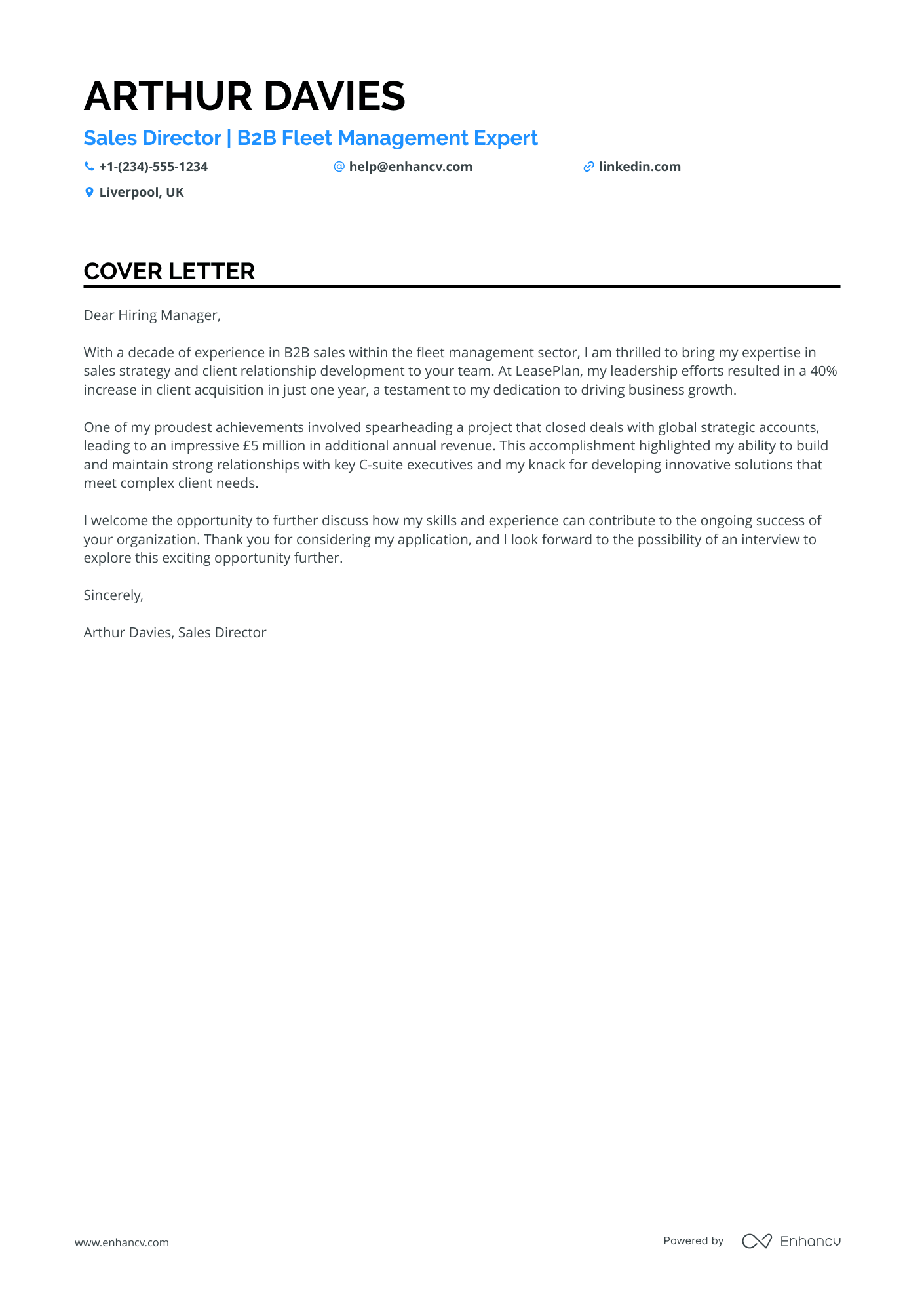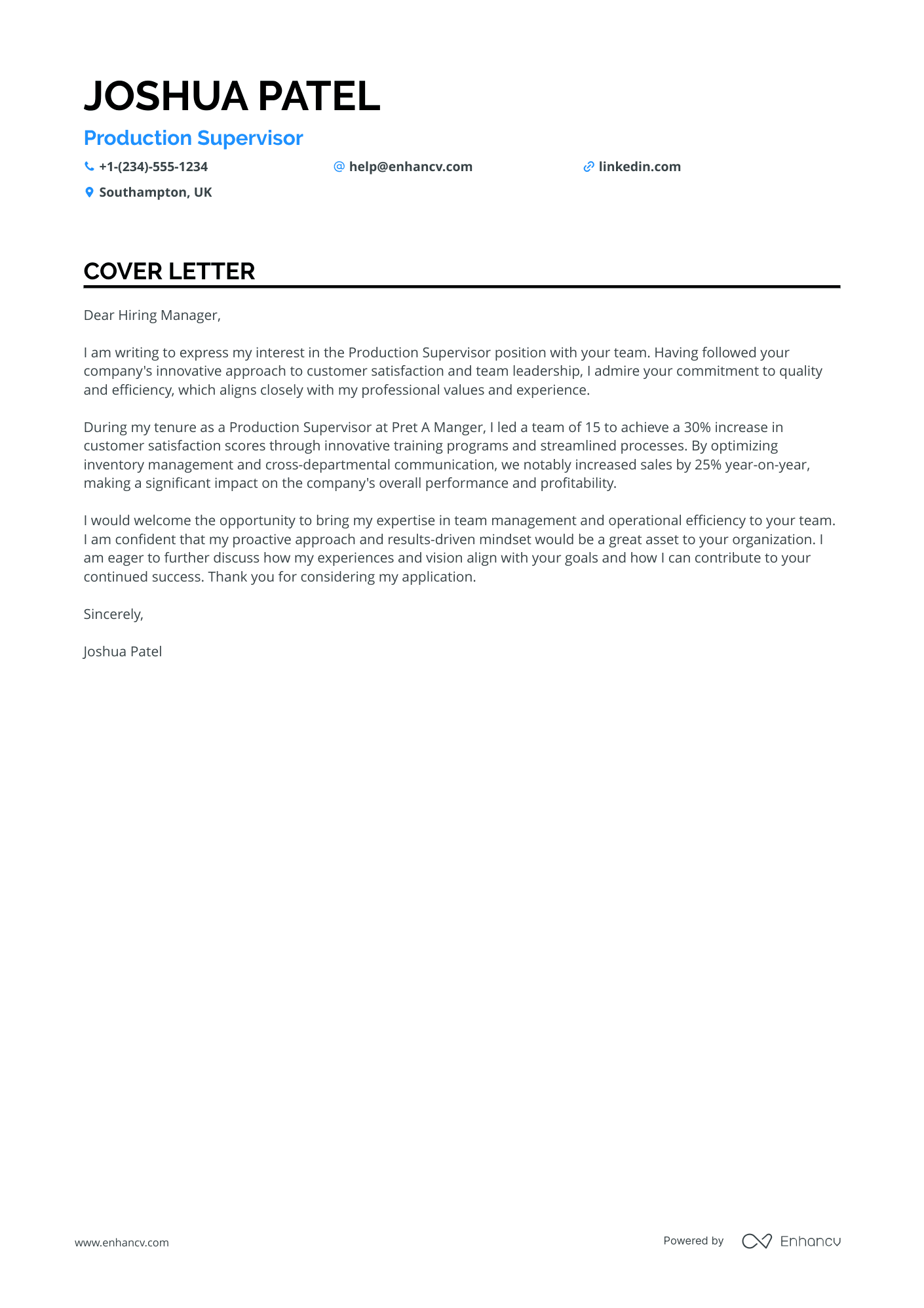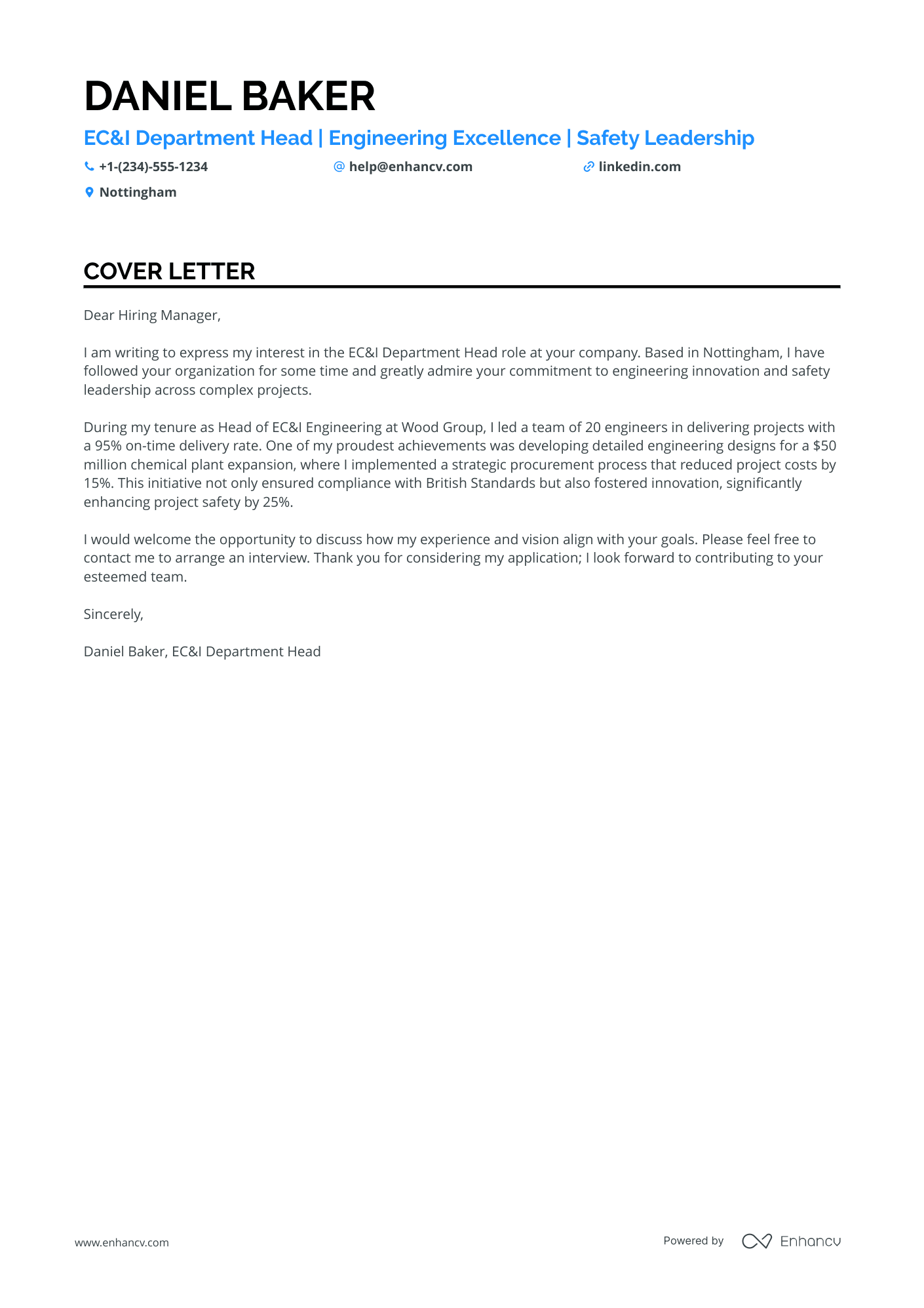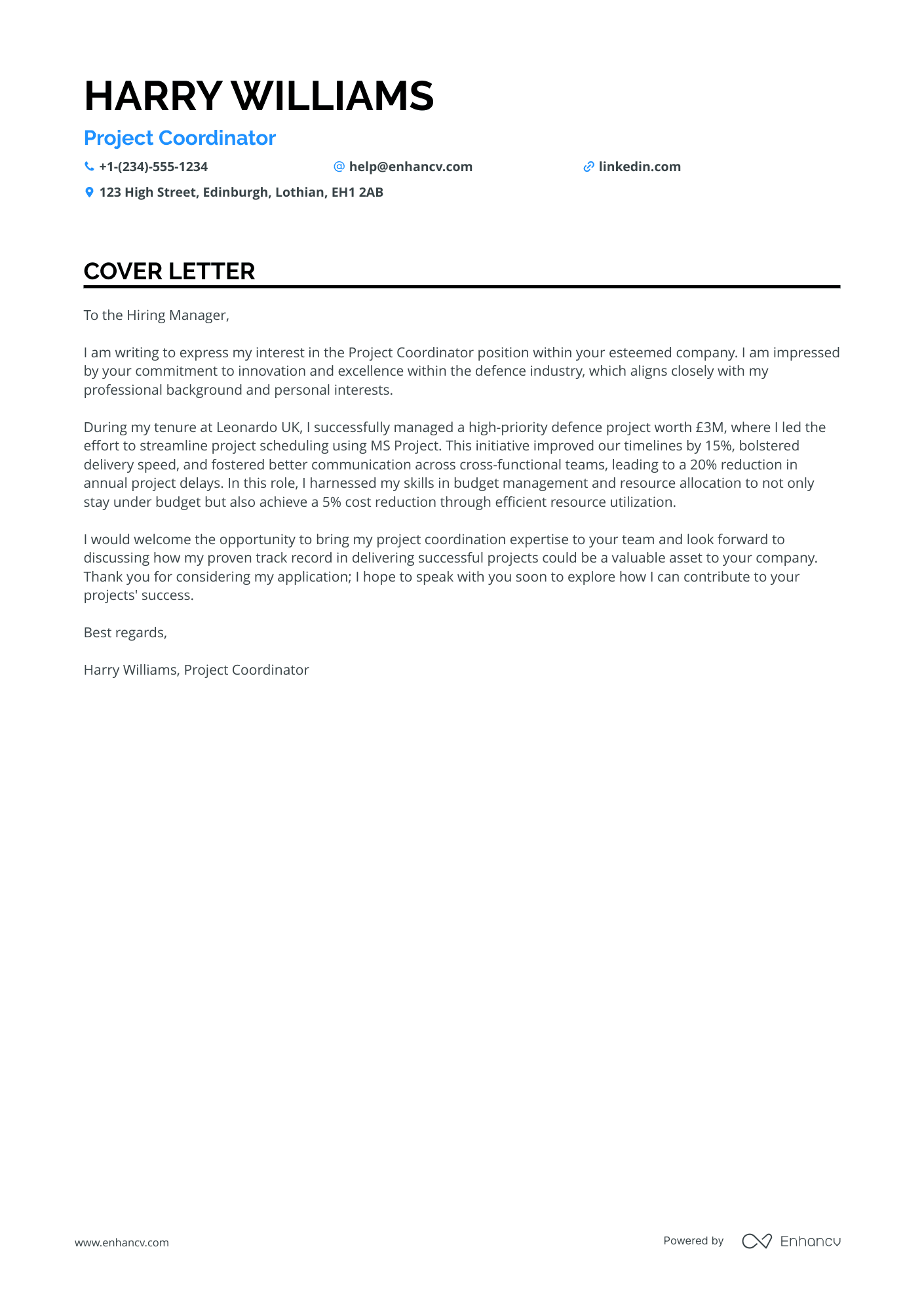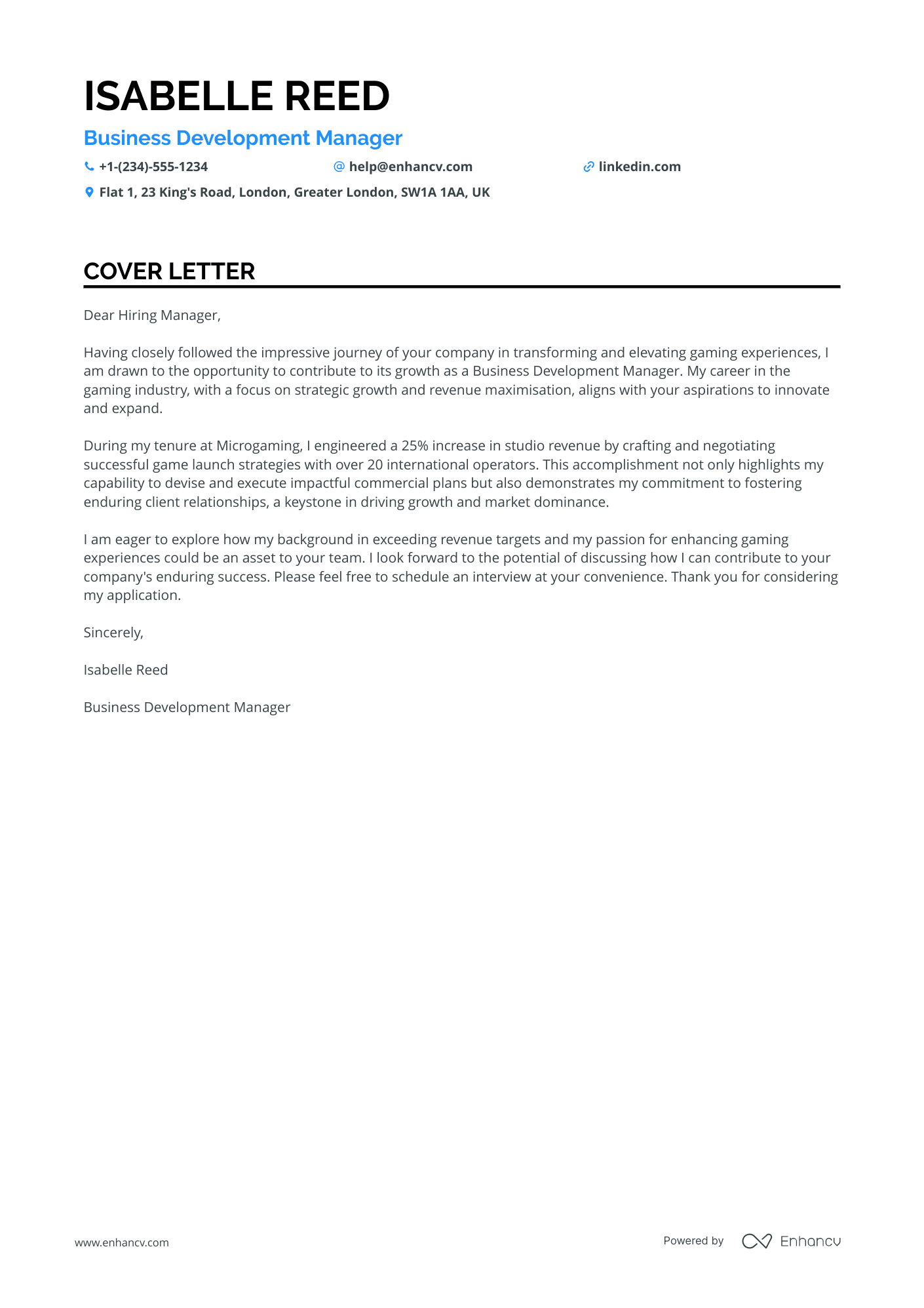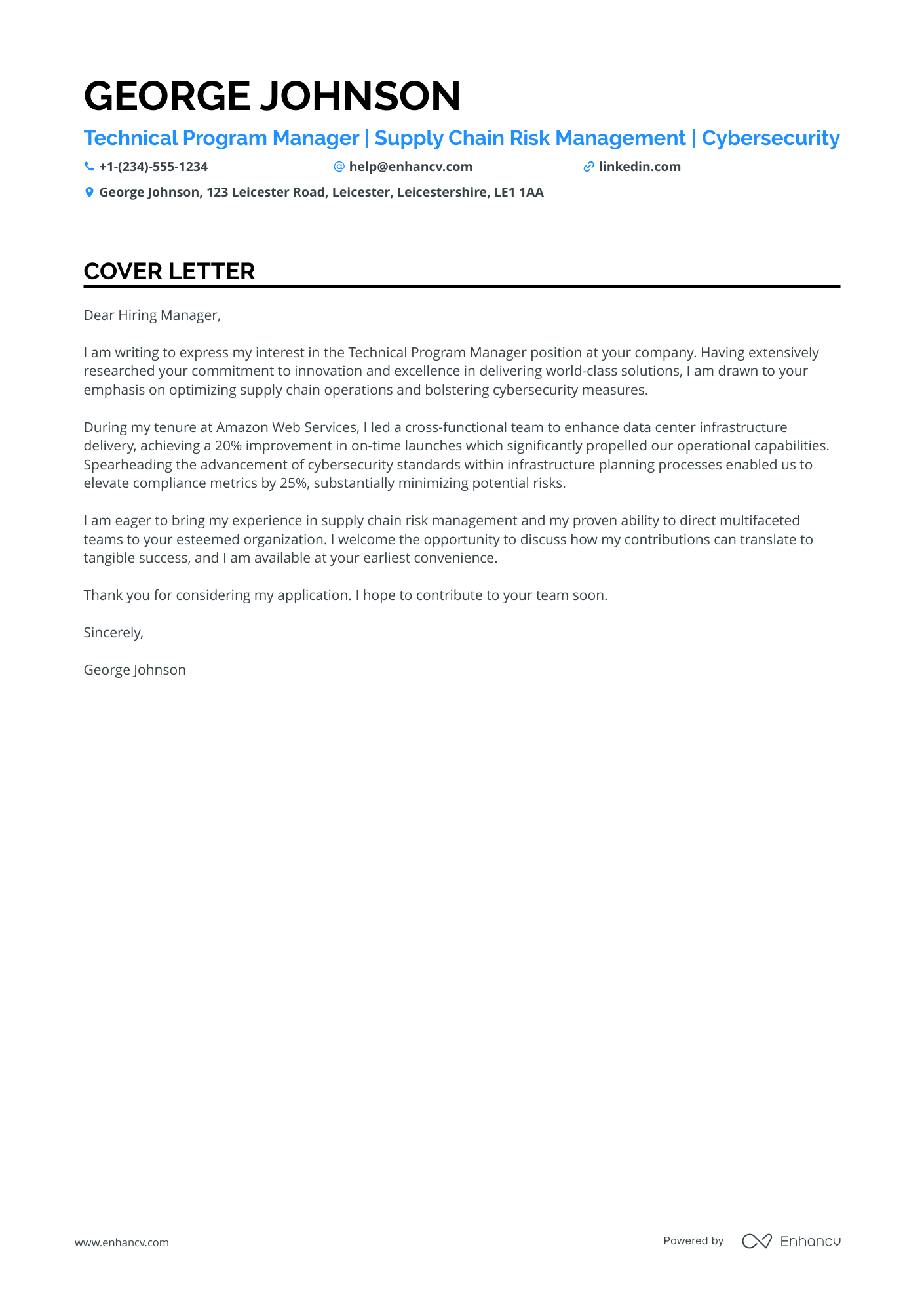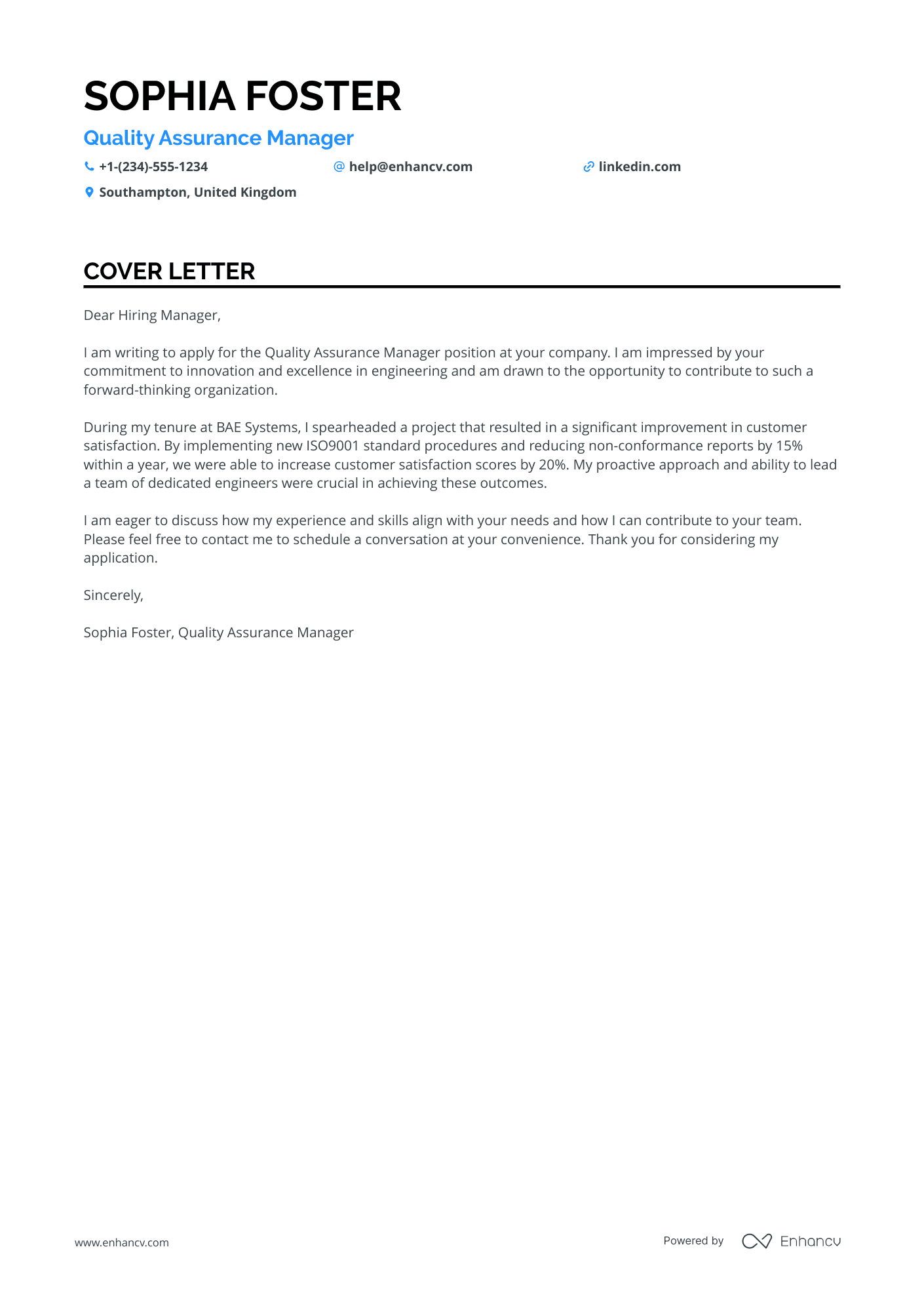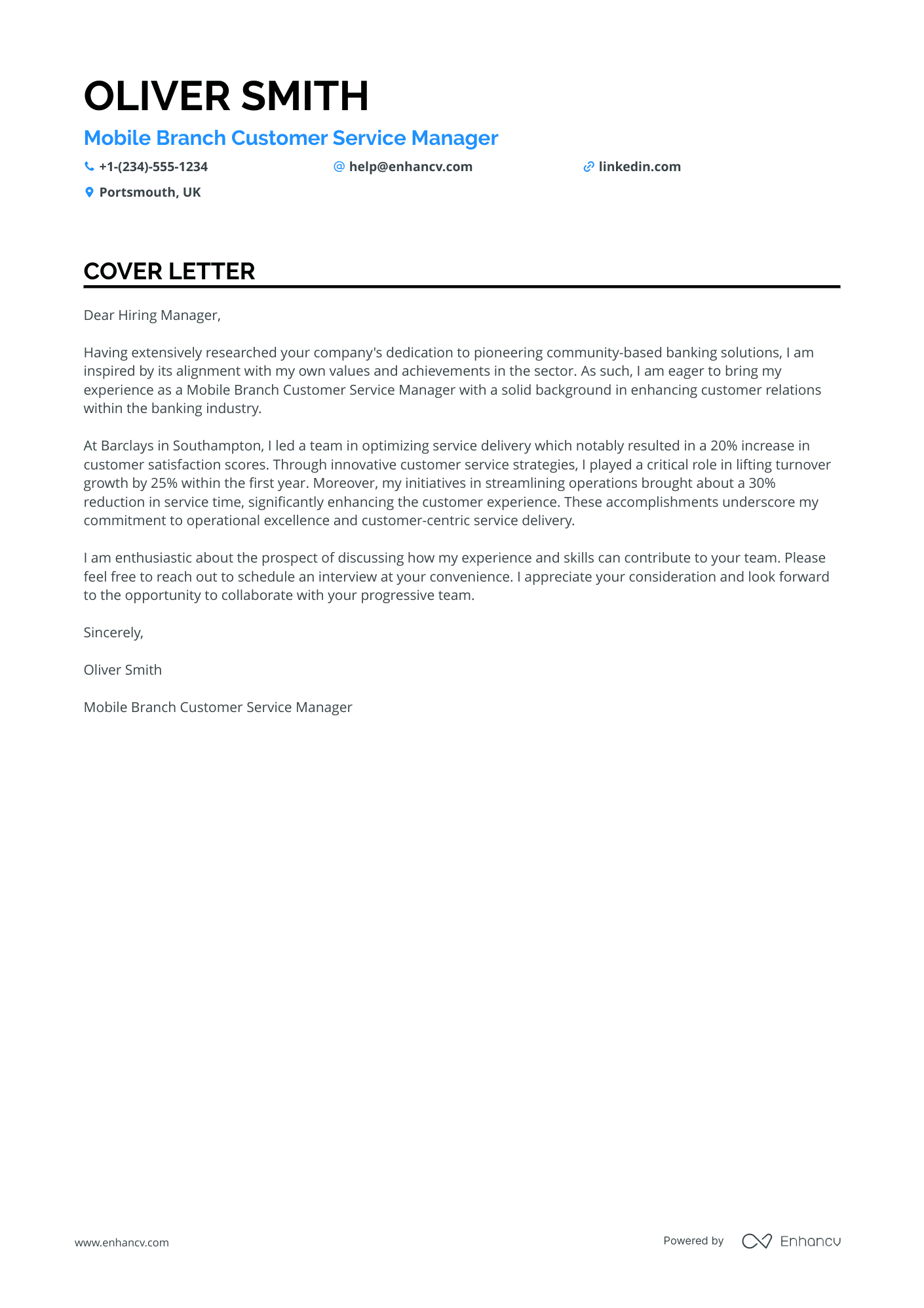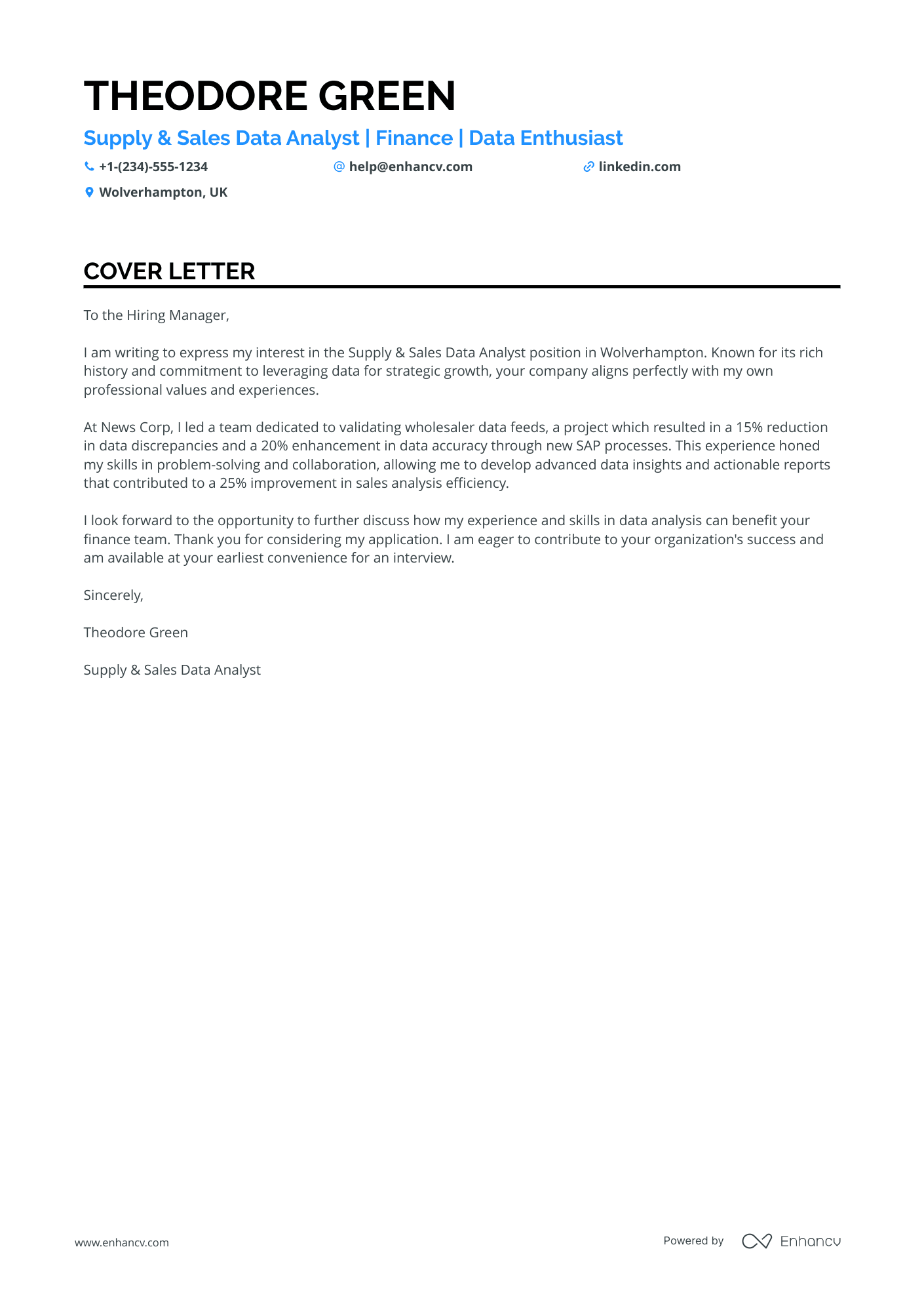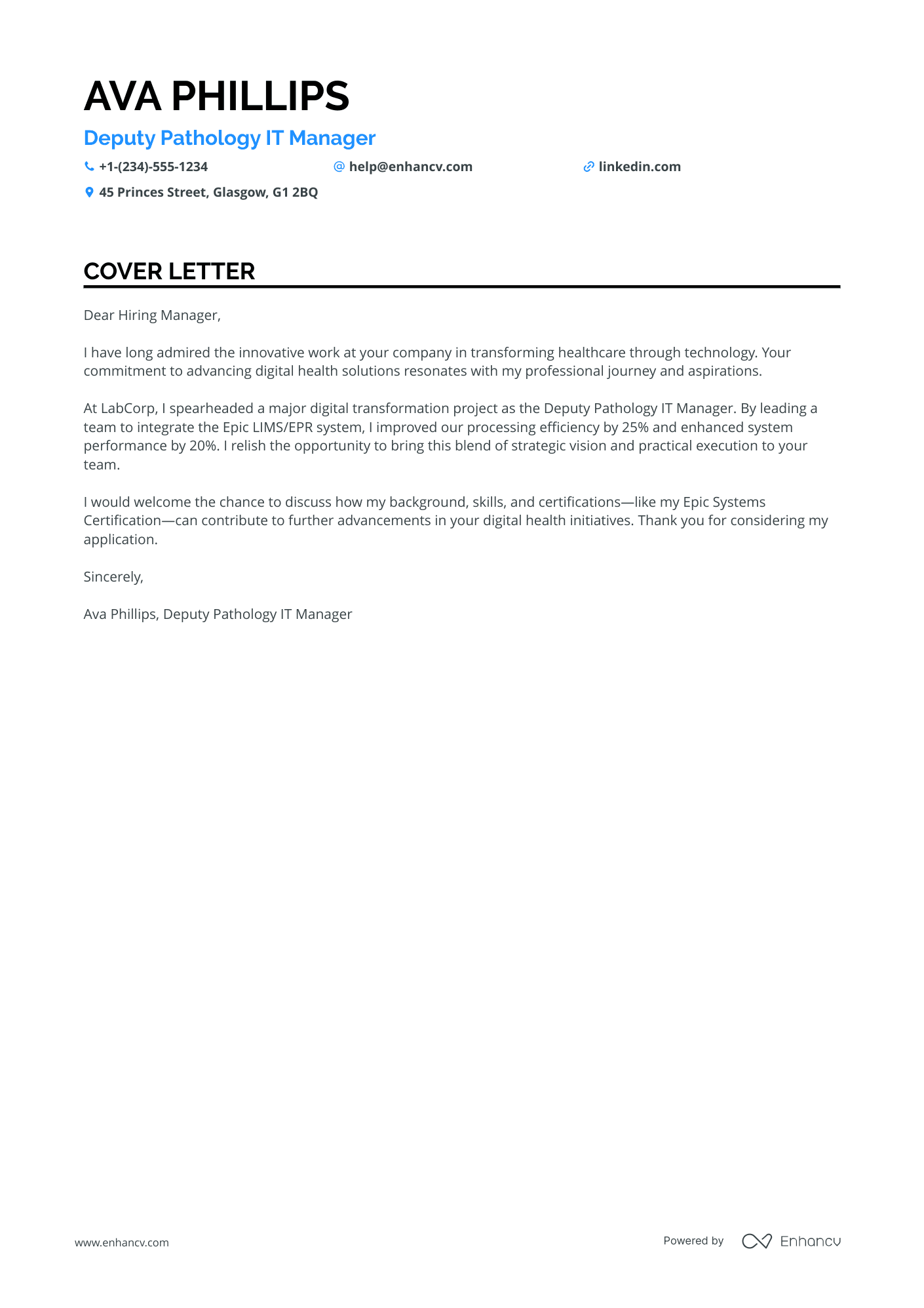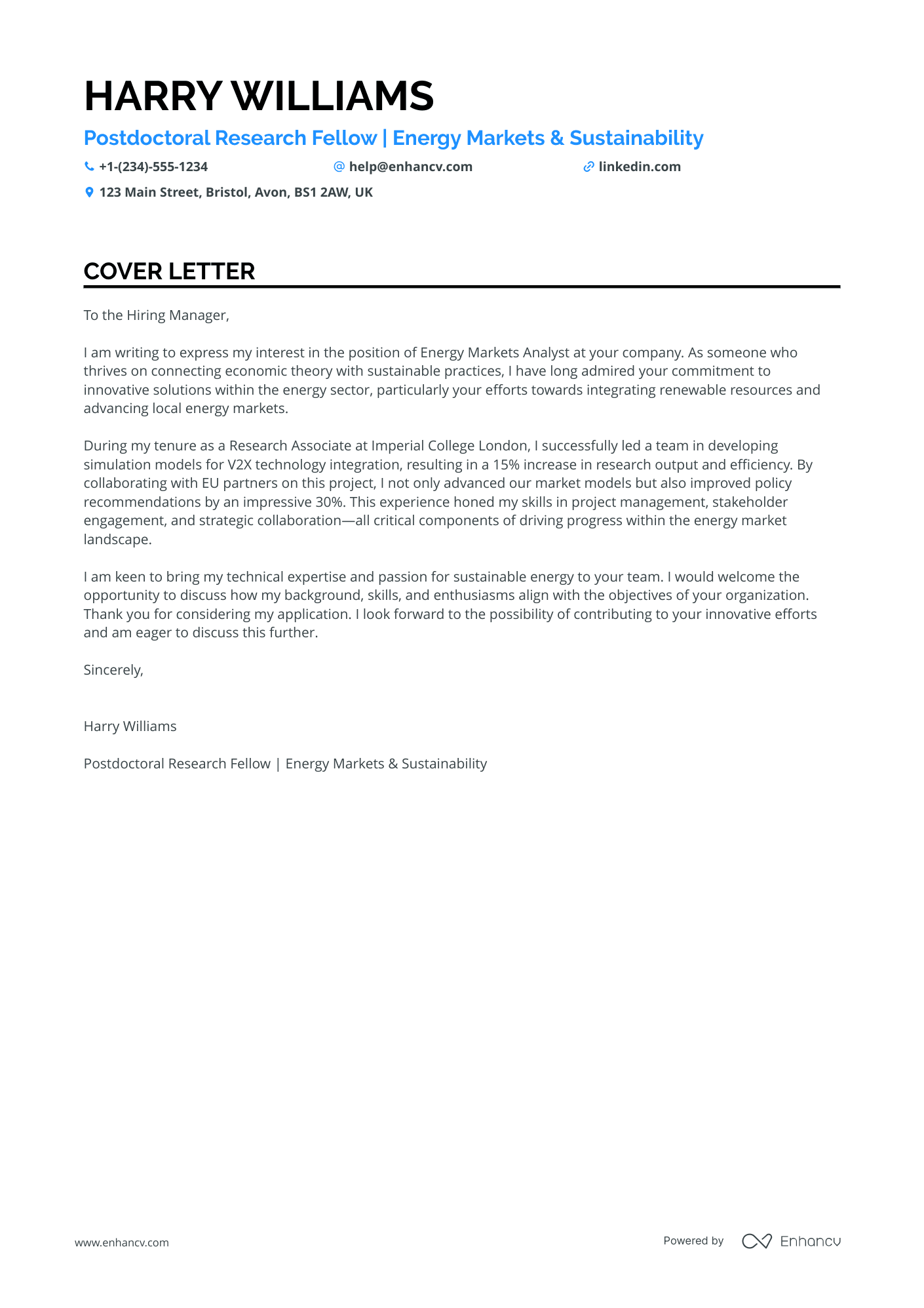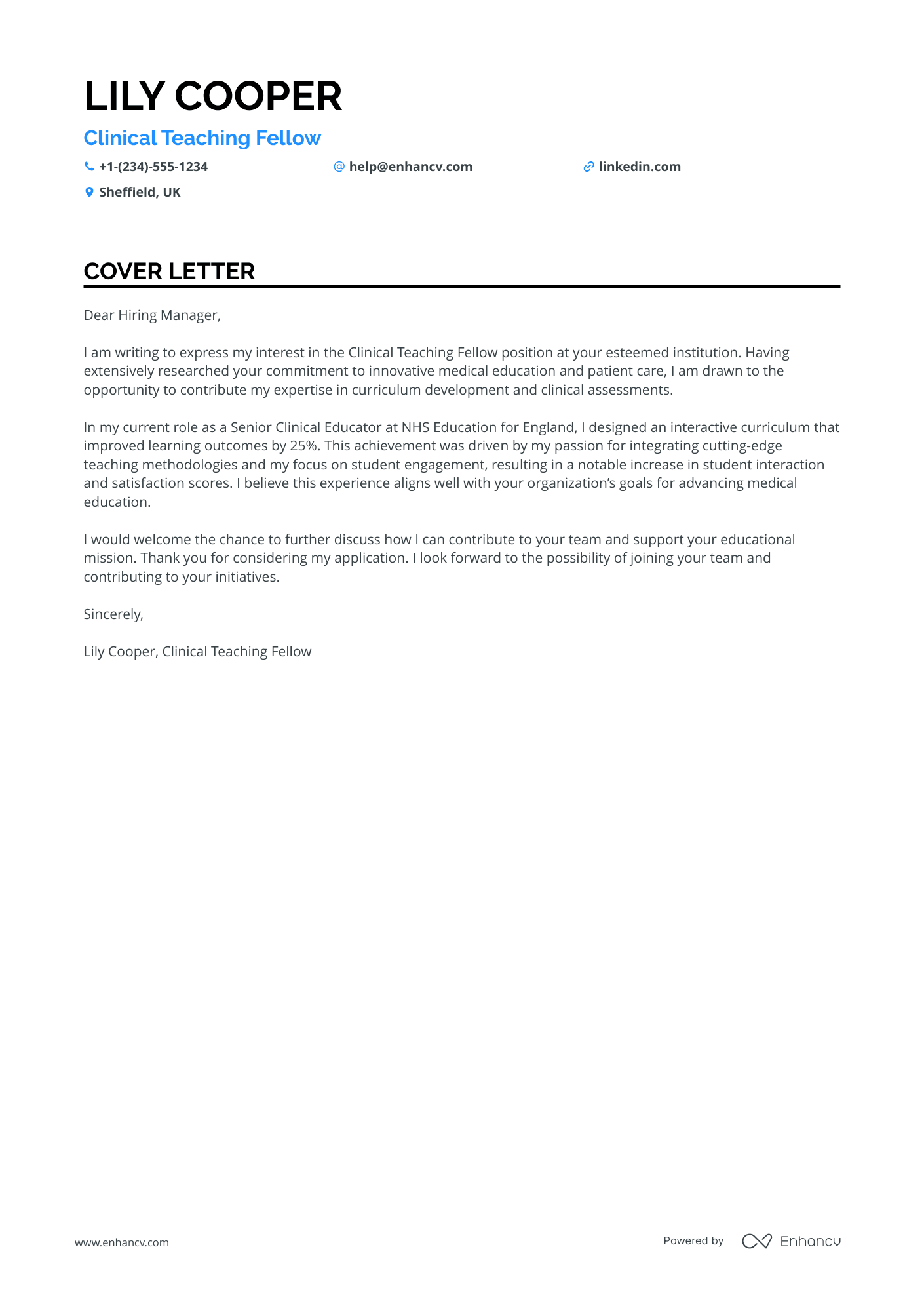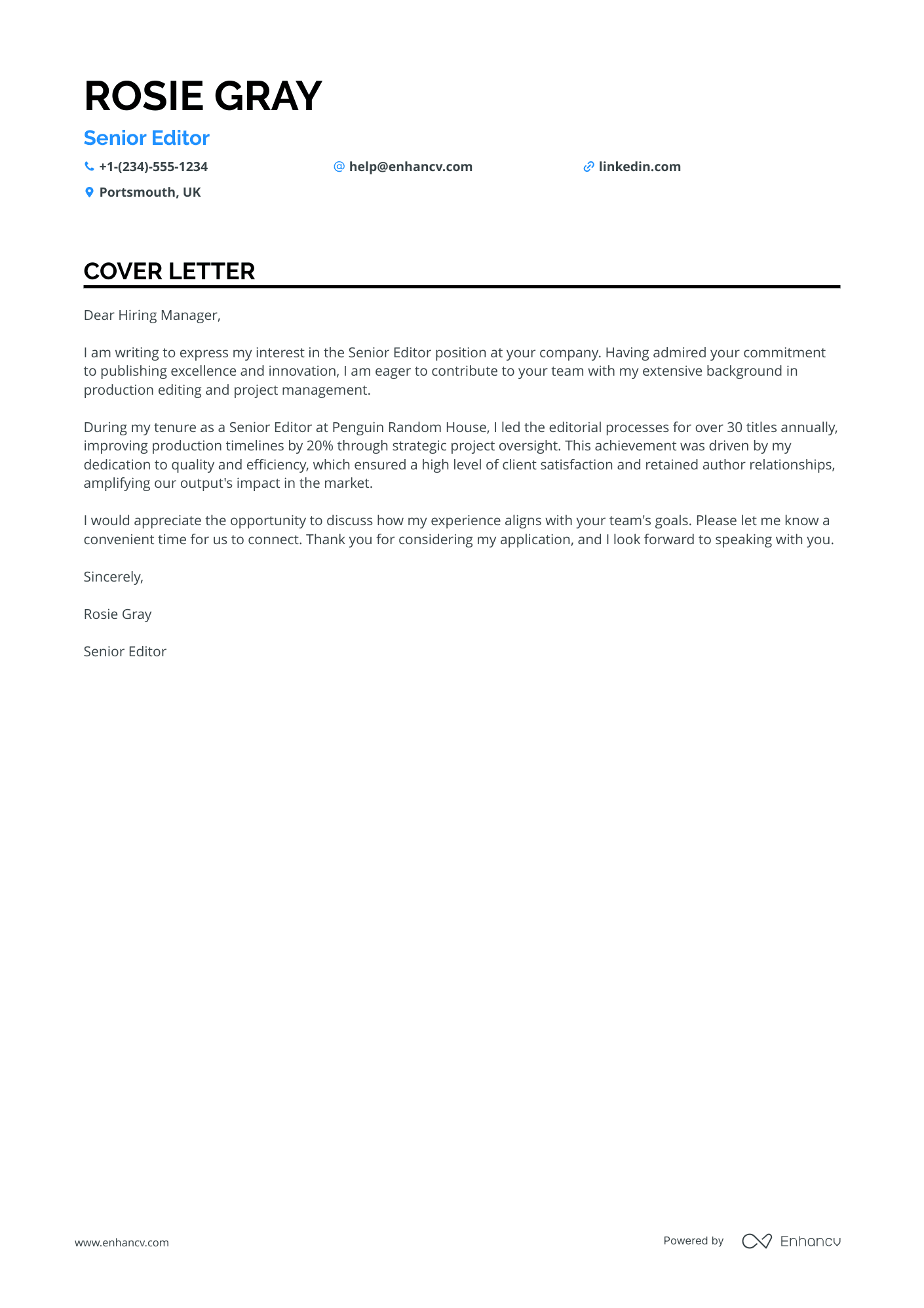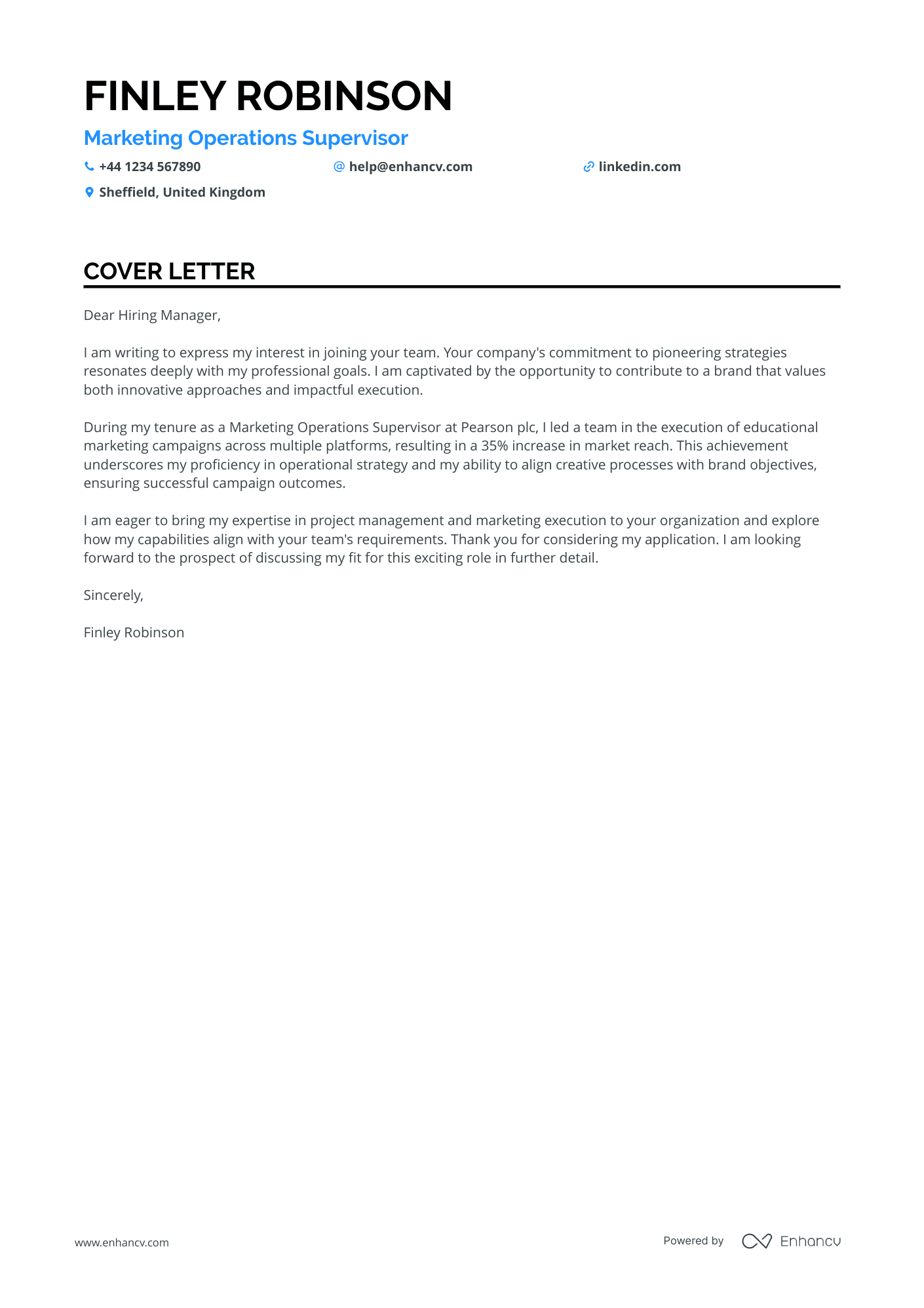When you start applying for jobs, you quickly realise that including a cover letter with your CV is a excellent way to stand out. But what should your cover letter focus on?
Should it emphasise your key achievements or simply list your responsibilities? And how can you effectively demonstrate that you're the ideal fit for the role?
One of the most common mistakes candidates make is either underselling themselves or overstating their experience.
In this guide, you’ll learn how to craft a compelling cover letter by showcasing your most significant professional achievement and telling the story behind it.
Cover letter examples for acting
By Experience
Acting Team Leader
- Highlighting Leadership Skills: The cover letter effectively showcases leadership abilities through documented successes in team management, performance evaluation, and development programmes.
- Emphasising Client Relations. Emphasising client relations as the core asset in improving service efficiency and enhancing productivity aligns well with the role’s expectations.
- Certifications and Courses: The inclusion of relevant certifications, such as Project Management Professional (PMP) and High-Impact Leadership Programme, helps to establish credibility and expertise in advanced project management and strategic leadership.
- Quantifiable Achievements: The candidate uses measurable achievements to demonstrate improvements in efficiency, client satisfaction, and operational costs, which provides concrete evidence of their capability in similar contexts.
Acting Shift Manager
- Emphasising Relevant Experience: The cover letter appropriately highlights the candidate's extensive experience in logistics and warehouse management, demonstrating their ability to lead teams and enhance operational efficiency.
- Showcasing Achievements: Clearly outlined achievements such as a 20% increase in operational efficiency and a reduction in workplace incidents by 10% offer concrete evidence of the candidate's capability and impact in previous roles.
- Detailing Skill Proficiencies: Specific skills crucial for the role, like KPI management and health & safety compliance, are explicitly mentioned, reinforcing the applicant’s suitability for a Warehouse Shift Manager position.
- Education and Continuous Learning: The cover letter includes advanced educational qualifications and relevant courses undertaken, which bolster the applicant’s credibility and commitment to professional development in supply chain logistics.
By Role
Acting Chief Executive Officer
- Highlight Relevant Experience: The cover letter effectively emphasises Louis Wood's extensive experience in strategic partnership development and social innovation, pertinent for a CEO role focused on strategic leadership.
- Quantify Achievements: It clearly quantifies achievements, such as a 30% increase in strategic partnerships and a 25% increase in funding, showcasing concrete results and value added to previous roles.
- Emphasise Leadership Skills: It underscores strong leadership skills by detailing significant responsibilities and outcomes, like spearheading strategic initiatives and leading executive teams, which are critical for a CEO position.
- Connect Skills to Role Objectives: The cover letter aligns skills like programme management and charitable governance with the overarching goals of fostering social impact and organisational growth, demonstrating a strategic fit for potential employers.
Acting Director of Human Resources
- Relevant Experience: The candidate effectively outlines their extensive experience in HR management across prestigious firms like GSK, AstraZeneca, and Pfizer, highlighting achievements such as improving employee engagement, optimising recruitment processes, and leading organisational change.
- Specific Achievements: Key accomplishments such as the Strategic HR Framework Implementation with a 30% engagement increase and a 25% reduction in time-to-hire are distinctly noted, demonstrating quantifiable results and leadership in HR strategy.
- Educational Background and Certifications: The inclusion of advanced degrees like the Master of Science in Human Resource Management and relevant certifications, such as the Talent Acquisition Specialist Certification, reinforces their expertise and commitment to continuous professional development.
- Passion and Alignment with Role: Expressing a passion for organisational culture development and talent management aligns well with HR roles, emphasising the candidate's dedication to fostering a productive and inclusive workplace environment.
Acting Head of Marketing
- Industry Expertise: The cover letter effectively highlights Sienna's experience and expertise in B2B strategies and digital innovation, which are crucial for a Head of Marketing role. This ensures that her skills align closely with the job's requirements.
- Data-Driven Success: Sienna demonstrates her proficiency in improving market engagement and campaign ROI through data-driven decisions, a valuable asset for any marketing leadership position.
- Leadership in Digital Transformation: Emphasising her role in leading digital transformation initiatives showcases her adaptability and forward-thinking approach, which is important in the rapidly evolving marketing landscape.
- Educational Credentials: The cover letter effectively highlights relevant educational achievements such as a Master’s degree in Marketing, adding credibility to her professional background and expertise.
Acting Operations Manager
- Emphasising the Transport Manager CPC Certification, a specialised qualification essential for transport operation management roles, demonstrating the candidate's formal expertise in logistics operations.
- Highlighting leadership skills with a detailed account of managing high-performing teams, showcasing abilities in coaching, mentoring, and conducting performance reviews that improve team efficacy.
- Including specific achievements with quantifiable results, such as improving operational efficiency by percentages or cost reductions, to effectively illustrate impact and success in previous roles.
- Listing process improvement and resource planning skills, important for a Site Operations Manager, paired with real-world examples of optimising operations through innovative strategies and cross-functional collaboration.
Acting Financial Controller
- Showcase of Achievements: The cover letter effectively highlights key accomplishments such as leading cost-saving initiatives at Marriott International and co-founding a cost control committee at Hilton Hotels & Resorts, which demonstrates impactful leadership and strategic financial management.
- Leadership Skills: Emphasising leadership capabilities, such as managing and mentoring a team, shows that the candidate possesses the necessary skills to foster team growth and improve efficiency in a financial management role.
- Relevant Experience: By detailing experience across major hotel chains like Marriott, Hilton, and Accor Hotels, the cover letter underscores the candidate's extensive industry knowledge and familiarity with large-scale financial operations.
- Strategic Certifications: Mentioning courses such as Advanced Financial Modelling and Strategic Cost Management reflects a commitment to continuous professional development and the acquisition of relevant skills crucial for strategic financial roles.
Acting Sales Director
- Highlighting Industry Expertise: Mentioning advanced fleet management strategies and strategic sales management certifications emphasises specialised knowledge crucial for a Sales Director role in fleet management.
- Results-Oriented Language: Use of quantifiable achievements, such as a 40% increase in client acquisition and £5 million in additional revenue, effectively demonstrates proven success in the field.
- Leadership Qualities: Emphasising team leadership and mentoring experience showcases the ability to lead and inspire a team, which is essential for a director-level position.
- Client Relationship Skills: Focusing on relationship building and satisfaction rates highlights the ability to maintain and grow client connections, a critical skill in business-to-business sales.
Acting Production Supervisor
- Highlight Relevant Experience: The cover letter effectively showcases Joshua's extensive experience in team leadership and workflow optimisation, key aspects for a Production Supervisor role.
- Quantifiable Achievements: Emphasise specific, measurable achievements such as the 25% increase in sales year-on-year and 30% boost in team productivity to demonstrate effectiveness.
- Skills and Certifications: Bring attention to skills like "Customer Service Excellence" and certifications such as "Operational Management in Food Services" to underscore Joshua's capacity to excel in enhancing customer experiences.
- Education and Courses: Mentioning the MBA and relevant courses like "Advanced Leadership Strategies" emphasises Joshua's commitment to continuous professional development, beneficial for the supervisory role.
Acting Department Head
- Leadership and Team Management: Highlighting his experience leading a team of 20 engineers and achieving a 95% on-time delivery rate illustrates strong leadership and management skills vital for a departmental head role.
- Project Cost Reduction: Emphasising achievements such as reducing project costs by 15% through strategic procurement initiatives showcases fiscal responsibility and strategic planning capabilities.
- Emphasis on Safety: The focus on enhancing project safety standards by 25% and achieving a high safety compliance rate is crucial for roles in high-hazard industries, where safety is paramount.
- Relevant Certifications and Courses: Mentioning the Certified Functional Safety Expert certification and advanced courses demonstrates ongoing professional development and specialised knowledge that is highly relevant to the role.
Acting Project Coordinator
- Industry-Specific Expertise: Highlighting over 5 years of experience in the defence industry demonstrates a strong understanding of the sector's unique demands and requirements, making the candidate more appealing to potential employers in this field.
- Quantifiable Achievements: The cover letter effectively uses specific metrics, such as budget savings, project value, and improvements in project timelines, to illustrate the candidate's capabilities and past successes.
- Relevant Skills and Tools: Emphasising proficiency in MS Project is crucial for a Project Coordinator role as it shows capability in handling project management tools, essential for effective scheduling and resource management.
- Education and Continuous Learning: The inclusion of advanced courses in project management and defence acquisition underlines a commitment to professional development and staying updated with industry standards and practices.
Acting Business Development Manager
- Industry Expertise: Isabelle's cover letter highlights her role as a "Gaming Industry Expert," showcasing her six years of experience in gaming, which is crucial for a Business Development Manager in this sector.
- Achievements and Metrics: The letter effectively uses quantifiable achievements, such as increasing studio revenue by 25% and exceeding revenue targets by 30%, to demonstrate her proven track record of success and commercial growth.
- Skills and Projects: Key skills like "Game Launch Plans" and successful management of numerous game rollouts are aligned with the job's requirements and underscore her capabilities in leading initiatives that align with strategic goals.
- Passion for Industry: Isabelle's passion for gaming and eSports is emphasised, reinforcing a genuine interest and alignment with the role, which can enhance cultural fit and motivation.
Acting Supply Chain Manager
- Mentioning specific achievements in supply chain risk management and cybersecurity demonstrates direct experience relevant to the role, enhancing credibility and suitability.
- Highlighting leadership roles and success in managing cross-functional teams communicates strong programme management and team collaboration capabilities, essential for a Technical Programme Manager.
- The inclusion of certifications like "AWS Certified Solutions Architect - Associate" signifies specialised knowledge in cloud infrastructures, aligning with the requirements for technological and infrastructural expertise.
- Emphasising skills such as "Process Optimisation" and "Cost Reduction Strategies" showcases the ability to drive efficiency and achieve cost-effective results, valuable traits for managing large-scale programmes.
Acting Quality Assurance Manager
- Emphasising ISO9001 expertise: By highlighting proficiency in ISO9001 standards and the implementation of these procedures, Sophia demonstrates her capability to align projects with international quality standards, which is crucial for a Quality Assurance Manager role.
- Quantifiable achievements: The cover letter effectively uses quantifiable metrics, such as improving customer satisfaction scores by 20%, to provide concrete evidence of Sophia's impact and success in her previous roles.
- Cross-functional collaboration: Mentioning collaboration with cross-functional teams showcases Sophia's ability to work alongside different departments and stakeholders, a vital skill for strategic quality improvement and streamlined processes.
- Leadership and training experience: Describing her role in leading teams and training staff highlights Sophia's leadership skills and her commitment to fostering a culture of continuous improvement within the organisation.
Acting Customer Service Manager
- Highlighting Experience: The cover letter effectively showcases Oliver Smith's 7 years of experience in customer-focused roles, which is crucial for a Mobile Branch Customer Service Manager.
- Emphasising Achievements: The letter details specific achievements such as a 25% increase in service efficiency and a 20% boost in customer satisfaction scores, demonstrating a strong track record of success.
- Relevant Skills: The cover letter lists skills that are directly relevant to the role, such as Customer Service Excellence, Operational Management, and Relationship Building, providing evidence of Oliver's capability to excel in the position.
- Education and Certifications: The inclusion of an MBA and a Certified Banking Professional course strengthens the candidate's qualifications, showing a commitment to further education and professional development specific to the banking industry.
Acting Data Analyst
- Highlighting specific certifications relevant to the role, such as the "SAP ERP Financials Configuration" certification, which demonstrates specialised knowledge in SAP systems crucial for data analyst positions.
- Emphasising measurable achievements, like leading a project that resulted in a 20% efficiency improvement in data processing operations, showcases the applicant's ability to deliver significant results.
- Detailing concrete experiences, such as improving circulation sales analysis efficiency by 25% through advanced Tableau reports, underscores the applicant's practical skills in data visualisation.
- Mentioning industry-relevant skills, such as "Data Analysis," "SAP ERP," and "Supply Chain Management," ensures alignment with the job requirements and highlights the applicant's core competencies.
Acting IT Manager
- Specific Experience: Ava highlights her role in leading IT integrations and digital strategies within the pathology domain, showcasing direct relevance and expertise for a Deputy Pathology IT Manager role.
- Certifications and Education: The mention of specific certifications such as Epic Systems Certification demonstrates specialised knowledge crucial for managing IT systems in healthcare.
- Quantifiable Achievements: The cover letter lists specific outcomes like a 25% improvement in processing efficiency and a 40% reduction in downtime, providing tangible evidence of Ava's contribution and effectiveness.
- Passion and Future Vision: Ava expresses a deep interest in healthcare IT innovations and data analytics, aligning her personal interests with professional goals, suggesting long-term dedication to the field.
Acting Research Fellow
- Highlight Project Leadership: Emphasising experience leading a team of 5 researchers in a project on local energy market systems effectively showcases leadership skills which are crucial for a Research Fellow role.
- Showcase Research & Publication Achievements: Publishing 6 high-impact papers expands visibility and demonstrates expertise, which is essential in academia and aligns well with the role's objectives.
- Emphasise Funding Acquisition: Securing £500,000 in funding highlights the ability to attract resources and support for research projects, a key component for research roles focused on sustainability initiatives.
- Demonstrate Cross-Disciplinary Collaboration: Collaborating with EU partners to pilot new market models underlines the importance of interdisciplinary collaboration, which can lead to significant improvements in policy recommendations.
Acting Clinical Director
- Highlighting specific metrics such as a 20% increase in student engagement scores and a 25% improvement in learning outcomes demonstrates the applicant's impact and competence.
- Emphasising roles and responsibilities that align closely with the desired position, such as developing innovative curricula and integrating simulation-based learning, strengthens relevance.
- Mentioning relevant skills like curriculum design, assessment development, and online learning proficiency underscores the candidate's comprehensive expertise in medical education.
- Noting awards and recognitions, such as the Curriculum Innovation Award and Excellence in Teaching Award, provides tangible evidence of excellence and commitment to the field.
Acting Senior Editor
- Experience and Role Progression: Highlighting Rosie's career progression from Assistant Editor to Senior Editor demonstrates her capability and growth within the industry, reflecting positively on her leadership and expertise.
- Project Management Skills: Emphasising on her skills in managing high-volume projects and improving production timelines by 20% shows her effectiveness in handling complex editorial processes, a valuable asset in publishing.
- Client and Team Collaboration: Her ability to foster strong author relationships and increase client retention by 25% underlines her collaborative communication skills, essential for both maintaining existing client relations and ensuring seamless team operations.
- Achievement-Focused Narrative: Including specific achievements such as editing a top-selling cookbook and reducing editorial errors by 15% highlights her impact and success in previous roles, making her a compelling candidate for further opportunities.
Acting cover letter example
Finley Robinson
Sheffield, United Kingdom
+44 1234 567890
help@enhancv.com
- Showcase Relevant Experience: Highlight your experience with managing marketing campaigns and increasing market reach, as these are critical for a Marketing Operations role. This demonstrates your capability to drive significant results in similar industry settings.
- Quantify Achievements: Mention specific metrics, like a 35% increase in market reach, to provide tangible evidence of your success and to illustrate your impact in previous roles.
- Align with Company Goals: Express a strong alignment with the company’s values or mission, such as its commitment to innovation and impactful execution, to demonstrate that you are a cultural fit and your professional goals are aligned with the company's vision.
- Emphasize Relevant Skills: Highlight critical skills like project management and operational strategy, which are directly applicable to the role you're applying for, to ensure the employer sees the alignment between your capabilities and their needs.
Importance of cover letters in the United Kingdom
A well-crafted cover letter can significantly strengthen your job application by emphasising why you’re an ideal fit.
Here are some reasons why it matters:
- Personalisation: Employers expect your cover letter to demonstrate how your skills and experience align with the company’s needs and/or values.
- Addresses what is omitted from your CV: If your career path includes gaps or changes, your cover letter is the best place to address these positively and explain their relevance.
- Opportunity to stand out: Many applicants have similar qualifications, so a tailored cover letter can show your unique attributes and experience.
What UK employers expect from a cover letter
A great cover letter can set you apart when applying for jobs in the UK.
Follow these tips to ensure you make a strong impression:
- Research thoroughly: Spend time delving into the company’s website, social media, and industry news to understand their projects, awards, and future plans. The more specific your knowledge, the better you’ll be able to demonstrate your suitability for the role.
- Reflect their values: Every UK company has its own set of values that guides their culture. Once you’ve identified them, make sure your cover letter reflects how your values and work ethic align with theirs. If they’re known for integrity, emphasise your commitment to ethical practices.
- Tailor your skills: Focus on aligning your most relevant skills with the job description. Look for key terms and priorities mentioned in the advert, and make sure to provide examples of how you excel in those areas.
How to format a acting cover letter
Before diving into the content, the structure of your cover letter should include the following elements:
- Your address and contact details
- The employer’s name and address
- Date
- Salutation or greeting
- Opening or introductory paragraph
- Middle or body paragraphs
- Closing paragraph
- Sign-off and signature
When it comes to the best font choice, consider modern options like Lato, Rubik, Raleway, Volkhov, Chivo, or Bitter as alternatives to Arial or Times New Roman.
Your cover letter should be single-spaced, with approximately 1-inch (2.5 cm) margins all around (our templates are set up automatically with this spacing in mind).
Ensure your CV and cover letter use the same font for consistency, and always send them as a PDF to prevent edits and maintian formatting.
Lastly, while Applicant Tracking Systems (ATS—the software used to match your application to set requirements) won't read your cover letter, recruiters certainly will, so make sure it stands out.
How to write your acting cover letter salutation
It's never advisable to begin your cover letter with 'Dear Sir/Madam', as it sounds comes across as impersonal.
Take the time to find out who is hiring for the role and address them directly in your cover letter greeting (e.g., 'Dear Mrs Chanceworth', 'Dear Harrod').
If you're uncertain where to find the hiring manager’s name, check the company website, look on LinkedIn, or send a courteous email requesting this information. Don't hesitate to ring reception either—they are unlikely to refuse to assist.
How to write your acting cover letter intro
While your cover letter should remain professional, adding a touch of personality or humour can make you stand out.
Hiring managers sift through countless applications, day in and day out. Anything unique or personable that grabs their attention could give you a competitive edge.
But do your homework first to ensure a dash of creativity would be appropriate and suitable to the company culture.
How to write your acting cover letter body
Which makes for a stronger cover letter body: a long-winded account of everything you’ve ever done, or a focused achievement that’s directly relevant to the job?
Hint: recruiters prefer the second.
When writing your cover letter, select your most impressive achievement that:
- Directly aligns with the job description and role.
- Is quantifiable with tangible metrics like numbers or percentages.
- Maps out your hard and soft skills, showcasing what makes you unique.
- Tells the story of the impact you could have on the organisation.
How to write a closing paragraph
Looking to leave a lasting impression with your cover letter closing?
Then, you should certainly end with a promise—one that outlines what you aim to achieve in the role. Ensure your goals are realistic and align with the company’s needs.
You might also include a call to action, enquiring when you can expect to hear back and what the next steps in the hiring process will be.
Conclusion
Your cover letter is an opportunity to showcase your personality and skills to potential employers. Start by addressing the hiring manager by name and tailoring your content to reflect the role’s requirements.
Include a specific example of your greatest achievement to illustrate your suitability for the position, while also expressing your enthusiasm for the company. Remember to format your letter professionally, ensuring it aligns seamlessly with your CV.
